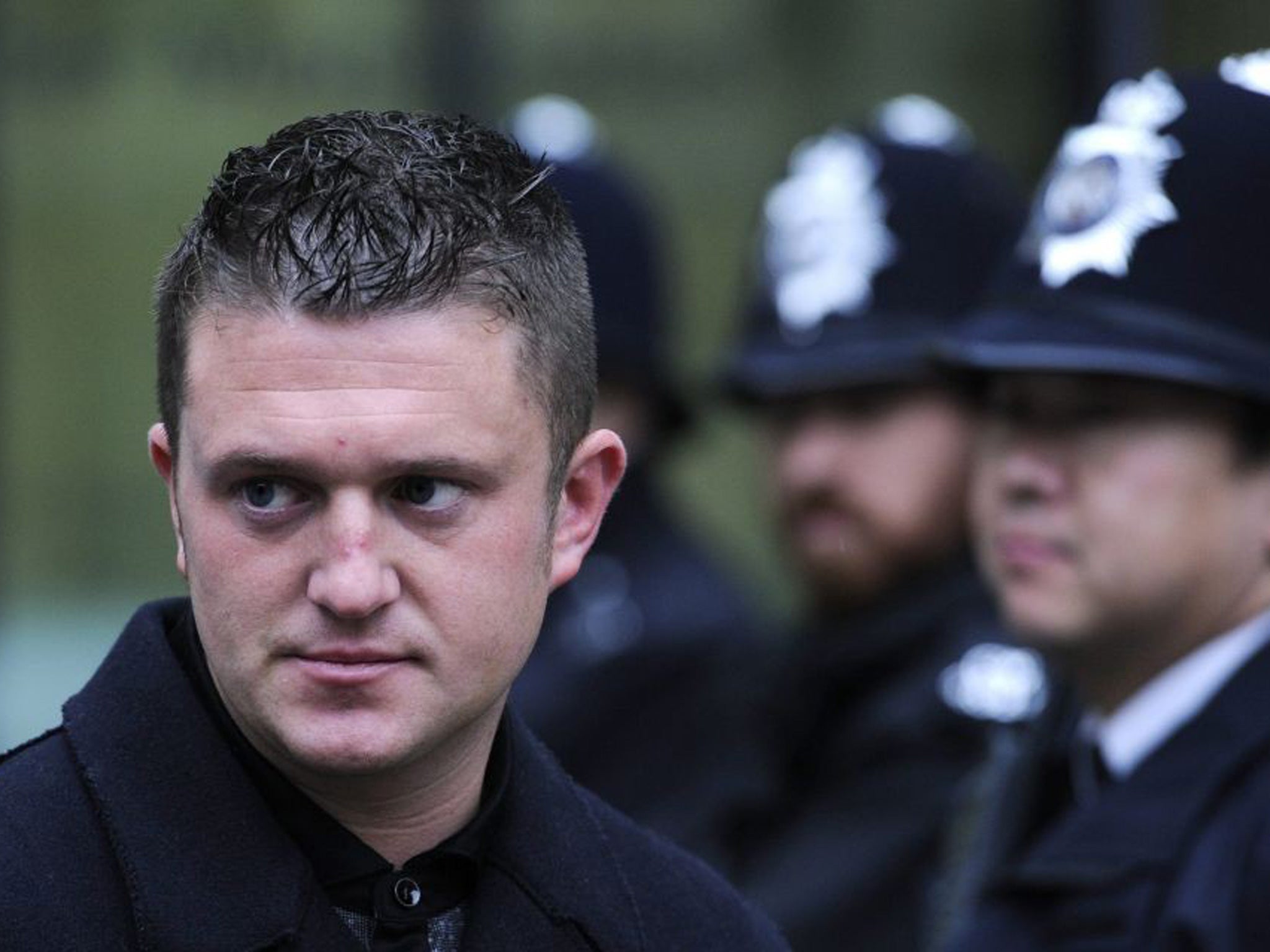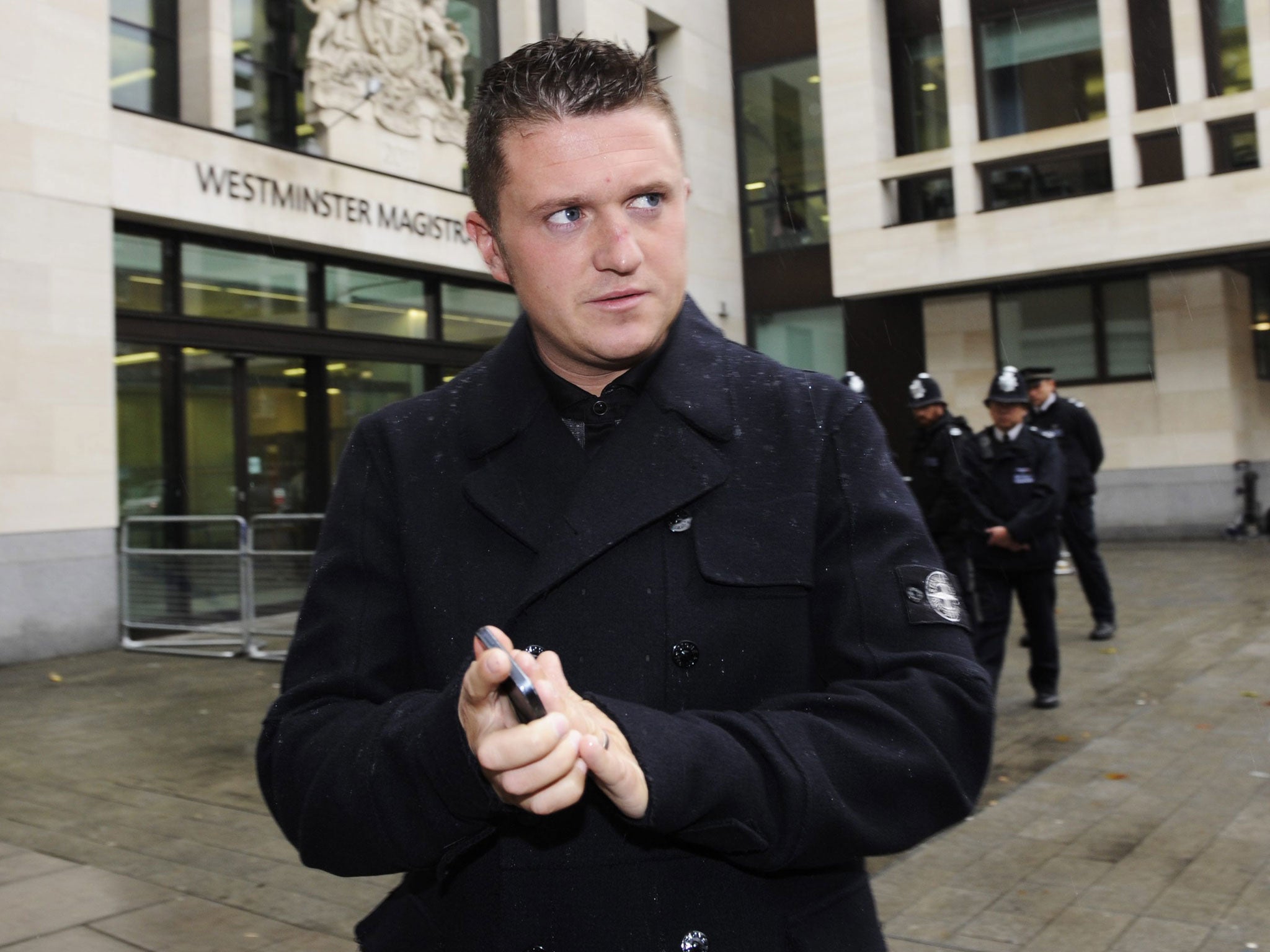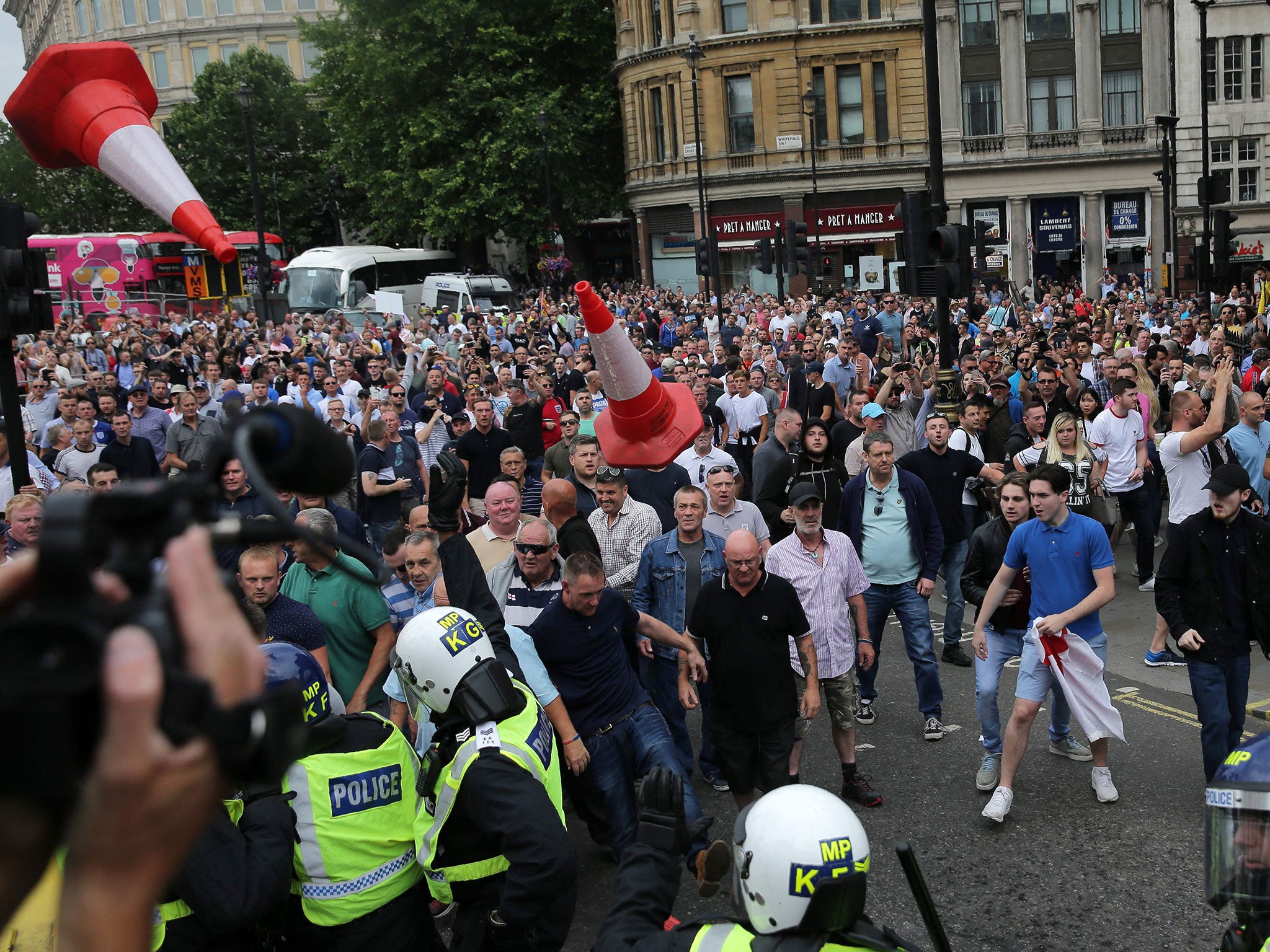Far-right leader Tommy Robinson is facing a new contempt of court hearing after judges quashed findings that saw him jailed for 13 months in Leeds.
The Lord Chief Justice took little over a minute to deliver the ruling, ordering Robinson to be freed from custody with immediate effect on the condition he attends the new hearing.
He was one of three Court of Appeal judges who dismissed a separate appeal against another contempt case against Robinson that was hearing in Canterbury in May 2017.
They found that proceedings in Canterbury should stand, but that a judge in Leeds should not have jailed Robinson within hours of broadcasting the Facebook Live video in question.
"There was no clarity about what parts of the video were relied upon as amounting to contempt, what parts the appellant accepted through his counsel amounted to contempt and for what conduct he was sentenced," their judgment read.
"Whilst the judge was entitled to deal with the contempt himself, the urgency went out of the matter when the appellant agreed to take down the video from Facebook. There should have been an adjournment to enable the particulars of contempt to be properly formulated and for a hearing at a more measured pace, as had happened in Canterbury."
They ordered Robinson to be freed from prison on bail, on the condition that he does not go within 400m of Leeds Crown Court and attends a new contempt hearing to take place at the Old Bailey "as soon as reasonably" possible.
That judge may decide to jail Robinson for contempt for a second time.
Why was he jailed?
Robinson was jailed for committing contempt of court with a Facebook Live video broadcast from outside Leeds Crown Court on 25 May.
The case he was discussing was subject to blanket reporting restrictions imposed under the Contempt of Court Act to ensure that three linked trials did not collapse.
The Section 4 (2) order made it illegal for anyone, in any format, to publish information on the case until the last trial had finished.
Robinson was initially arrested on suspicion of breach of the peace, after heckling people entering Leeds Crown Court and trying to film the defendants.
But prosecutors made the decision to charge him with contempt of court after viewing video evidence and finding that Robinson was subject to a separate suspended sentence.
Robinson, who appeared in court under the name Stephen Christopher Yaxley-Lennon, admitted the crime later the same day and was sentenced to 13 months imprisonment.
Judge Geoffrey Marson QC initially banned reporting of Robinson’s imprisonment but lifted the order following a challenge by The Independent and local media.
The judge activated a three-month sentence for a previous contempt of court offence that had been suspended by another judge in Canterbury on the condition that Robinson committed no further crimes.
Judge Marson added 10 months for the new offence, telling Robinson that he had violated restrictions aiming to ensure a fair trial.
After watching the Facebook Live video in court, Judge Marson said it was also “highly prejudicial” to the defendants, adding: “I respect everyone’s right to free speech. That’s one of the most important rights that we have.
“With those rights come responsibilities – the responsibility to exercise that freedom of speech within the law.
“I am not sure you appreciate the potential consequence of what you have done.“
Robinson was defended by an experienced barrister, Matthew Harding, who confirmed to the court that his client was aware of the reporting restriction but believed he was not violating it because the information he used was in the public domain.
Mr Harding claimed Robinson felt “deep regret” after being told of the potential consequences of his video and said he had been at risk from other inmates while serving a previous prison term for mortgage fraud.
What happened in the video?
Standing outside Leeds Crown Court, Robinson spoke for an hour and 15 minutes about the ongoing trial, his views on Muslims and Islam.
He made clear that he was aware of the restrictions during the Facebook Live video, as well as the danger of being jailed.
“There is a reporting restriction on this case,” the former English Defence League (EDL) founder said.
“I have to be super careful, you see, because when I was coming to these court cases, part of what the police did was they dawn raided me and they put me on a contempt of court charge, which would mean that I could face prison.”
But he encouraged more and more people to watch the stream, which at one point reached 10,000 viewers – a factor the judge said made his crime more serious.
After more than an hour of broadcasting, footage showed police officers approaching to arrest him for alleged breach of the peace.
“Can you get me a solicitor?” he asked his supporters while being searched and bundled into a police van. “This is ridiculous, I haven’t said a word…I’ve done nothing.”
And Robinson had been convicted of contempt before?
The 35-year-old was already subject to a suspended sentence for committing contempt during a rape trial in Canterbury in May 2017, and had been told that if he fell foul of the law again he would go to prison.
Robinson was prosecuted for attempting to film defendants at Canterbury Crown Court, despite notices stating the move is illegal all over the building.
Judge Heather Norton said at the time: “This contempt hearing is not about free speech. This is not about the freedom of the press.
“This is not about legitimate journalism; this is not about political correctness; this is not about whether one political viewpoint is right or another. It is about justice, and it is about ensuring that a trial can be carried out justly and fairly.”
Judge Norton sentenced Robinson to three months’ imprisonment but suspended the sentence for 18 months, meaning it would not come into effect unless he committed further offences. His lawyers had claimed he was ignorant of the filming ban.
“You will now be under no illusions whatsoever as to what you can and cannot do,” the judge told Robinson.
“If you commit any further offence of any kind, and that would include a further contempt of court by similar actions, then that sentence of three months would be activated, and that would be on top of anything else that you were given by any other court.”
Britain First leaders Paul Golding and Jayda Fransen were jailed for religiously-aggravated harassment over their actions during the same trial, when they filmed and harassed people they incorrectly believed were involved, posted offensive leaflets and shouted racist abuse at a family home.
Their actions endangered the prosecution of three men and a 17-year-old boy who were jailed in September for raping a 16-year-old girl who had asked them for directions, after taking her to a flat above a kebab and pizza restaurant in Ramsgate.
Robinson previously raised fears the Finsbury Park terror attack trial would collapse after he live-streamed interviews with journalists before the verdict was handed down.
Is Robinson a journalist himself?
Robinson’s Facebook page describes him as an “independent reporter bringing you the truth and stories others try to hide” but he is not a professional journalist.
Robinson co-founded the English Defence League in 2009 and became known for leading frequently violent protests across the UK against what it described as Islamist preachers and organisations, but in reality targeting Muslims more widely.
He quit the EDL claiming he was concerned over the “dangers of far-right extremism” in 2013 and his activism was then disrupted by two lengthy prison sentences.
After a failed attempt to start a British branch of the anti-Islam German group Pegida, Robinson joined the Canadian website Rebel Media as a contributor in February 2017.
An archive of his videos show a range of commentary on issues including terrorism, immigration, the Labour Party, grooming gangs and his critics.
None of the stories feature factual news being reported for the first time, or in line with the ethical standards that professional journalists are trained to uphold under the Editors’ Code of Practice or Ofcom Broadcasting Code.
Robinson is not known to have a qualification in journalism or to have undergone any legal or ethical training.
He has repeatedly claimed to “expose” grooming gangs and rapists, but uses information that has already been reported by the local and national media.

Has Robinson been jailed before?
Leeds Crown Court heard that Robinson, now 35, has a string of previous convictions for offences including assault, drugs possession, public order offences.
Stretching back to at least 2005, much of his criminal record relates to football violence and his activities as founder of the far-right English Defence League (EDL).
Robinson’s alias is itself taken from the member of a well-known football hooligan firm in his hometown of Luton.
He has been convicted of offences including using threatening and abusing behaviour during a fight between football fans, then jailed for breaching his bail conditions by attending an EDL demonstration.
In September 2011 he was convicted of common assault and was jailed for three days in November that year over a protest at Fifa’s headquarters in Zurich.
In 2013, he was jailed for 10 months for entering the US with a fake passport, having pleaded guilty to possession of a false identity document with improper intention.
Robinson had been unable to legally enter the country because of drug convictions, Southwark Crown Court heard, and so used a friend’s passport in the name of Andrew McMaster to get to New York.
Then in 2014, Robinson was jailed for 18 months for mortgage fraud amounting to £160,000.

What do his supporters say?
Robinson’s followers have defended his statements as “free speech” and have used his imprisonment to claim the “establishment” was attempting to silence his views.
Donald Trump Jr, the US President's son, shared a tweet from a Robinson supporter with the comment “don't let America follow in those footsteps”, while foreign politicians including Dutch opposition leader Geert Wilders have called for his release.
Robinson has been increasing his international audience by working with members of the American alt-right and ethno-nationalist Generation Identity movement, whose leaders have been prevented from entering the UK.
Why do people call Robinson an extremist?
Critics say Robinson’s statements on Islam and other issues are extreme, racist and have the potential to incite violence.
Prosecutors and the former head of UK counter-terror policing said his social media posts had radicalised Darren Osborne, who ploughed a van into Muslim worshippers in Finsbury Park last year.
Former Metropolitan Police Assistant Commissioner Mark Rowley said Osborne “had grown to hate Muslims largely due his consumption of large amounts of online far-right material including, as evidenced at court, statements from former EDL leader Tommy Robinson, Britain First and others…there can be no doubt that the extremist rhetoric he consumed fed into his vulnerabilities and turned it into violence.”
Mr Rowley compared Robinson to the Islamist extremist Anjem Choudary, who is also from Luton and serving a prison sentence for inviting support for Isis.
The officer said they gained “notoriety and attention” at the same time as they were positioned on the opposite sides of public debates in the 2000s.
“Robinson became a regular fixture in our media giving him the platform to attack the whole religion of Islam by conflating acts of terrorism with the faith often citing spurious claims, which inevitably stirred up tensions,” Mr Rowley previously said.
“Such figures represented no more than the extreme margins of the communities they claim to speak for yet they have been given prominence and a platform.”
Robinson used to broadcast his activities on Twitter as well as Facebook, but was permanently banned from the platform earlier this year.
He claimed to be helping counter far-right extremism for a brief period after leaving the EDL, speaking alongside the Quilliam think tank in 2013.
“We think it unfortunate that, following our efforts to engage with Tommy Robinson and help him move away from extremism, he seems to have regressed,” a spokesperson said last year.

Why was Robinson released from prison?
Tommy Robinson was released from prison on 1 August, but the Lord Chief Justice asked that he be freed on the condition he attends a new hearing over alleged contempt of court in Leeds.
It is possible he could be jailed again over this separate incident, which occurred on 25 May.







